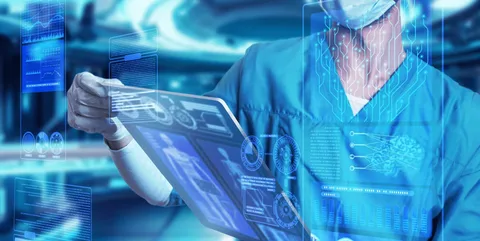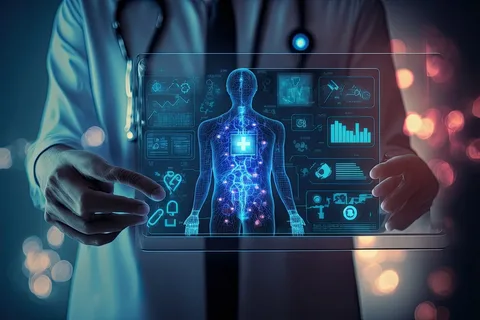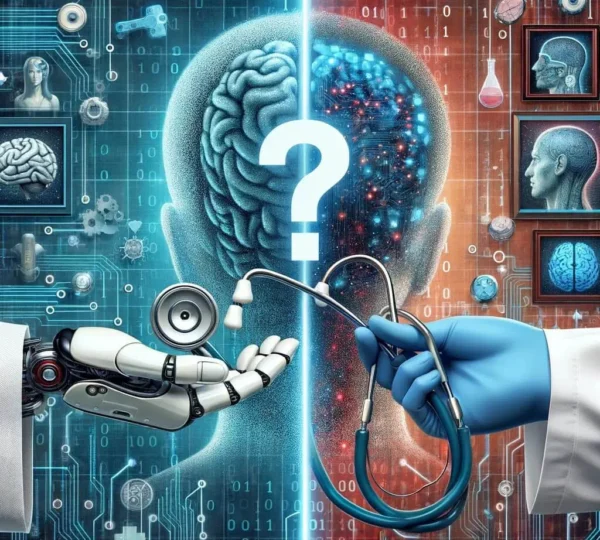Introduction
Artificial Intelligence AI has made tremendous strides in various industries, but its potential in healthcare is nothing short of revolutionary. The healthcare sector, traditionally reliant on human expertise and manual data handling, is undergoing a profound transformation through the integration of AI technologies. AI in healthcare refers to the use of algorithms, machine learning, and data analytics to mimic human intelligence in processing complex medical data, making diagnoses, predicting patient outcomes, and even managing hospital resources.
The application of AI has brought forth data driven healthcare solutions that enable more precise, faster, and cost effective treatment methods. AI ability to process vast amounts of data from patient records, diagnostic images, genetic information, and even wearable health devices has allowed healthcare professionals to make more informed decisions. This innovation is not just enhancing the quality of care but, importantly, saving lives.
This article explores the various ways AI is shaping healthcare, from diagnostics and treatment to healthcare management and research. We will also discuss the challenges, ethical considerations, and future implications of AI in the medical field.
AI in Diagnostics
One of the most transformative uses of AI in healthcare is in diagnostics. AI algorithms can analyze complex medical data, such as images, lab results, and genetic information, to detect diseases and conditions that might otherwise go unnoticed by human clinicians.
AI and Imaging
AI systems are particularly proficient at analyzing medical imaging data. Technologies like deep learning have enabled AI to detect early signs of diseases such as cancer, neurological disorders, and heart disease in imaging scans like X rays, MRIs, and CT scans. Machine learning models can be trained to identify abnormalities in medical images with a level of accuracy that often surpasses human radiologists.
For example, AI tools like Google DeepMind have been trained to identify diabetic retinopathy in eye scans, a leading cause of blindness. Early detection of this condition through AI has the potential to prevent vision loss and save lives by enabling earlier interventions.
AI in Genetic Testing
AI is also transforming the way healthcare providers understand genetic information. By analyzing genomic data, AI systems can identify genetic predispositions to diseases like cancer, Alzheimer’s, and cardiovascular conditions. AI powered tools assist doctors in tailoring treatment plans based on a patient genetic makeup, allowing for personalized medicine approaches that maximize efficacy and minimize side effects.
In oncology, for instance, AI algorithms are used to analyze cancer genomes to predict which treatments will be most effective based on a patient’s genetic profile, improving the chances of survival.
Predictive Analytics for Early Diagnosis
AI ability to process and analyze large volumes of data can also enable predictive analytics in healthcare. By using machine learning models trained on historical health data, AI can help predict the likelihood of developing certain conditions, even before symptoms arise. Early diagnosis through predictive analytics can save lives by enabling early intervention for diseases like sepsis, stroke, and heart failure.
AI in Treatment
AI is not only changing how diseases are diagnosed, but also how they are treated. AI technologies assist healthcare professionals in making more accurate treatment decisions, optimizing patient outcomes, and ensuring the right medications are prescribed.
AI in Personalized Treatment Plans
By analyzing patient data, including medical history, lab results, and genetic information, AI can help doctors design personalized treatment plans that are more likely to yield successful outcomes. This is especially important in the treatment of complex diseases like cancer, where personalized approaches can make a significant difference.
AI algorithms can also identify the best combination of medications and therapies for individual patients, improving treatment efficacy and reducing adverse reactions. For example, AI systems like IBM Watson for Oncology are already being used to recommend treatment options for cancer patients based on the latest research and clinical trials.
Robotics and Surgery
AI powered robots are transforming surgery by enhancing precision and reducing the risk of human error. Robotic surgery systems, guided by AI algorithms, can perform complex procedures with greater accuracy, smaller incisions, and faster recovery times.
AI driven robots such as the da Vinci Surgical System are used in minimally invasive surgeries, providing surgeons with enhanced visualization, real time data, and precision tools. This not only improves patient outcomes but also reduces recovery time and the risk of complications.
AI in Drug Discovery
The drug discovery process has traditionally been long and expensive, but AI is helping to expedite this process. By analyzing vast datasets, AI can identify potential drug candidates much more efficiently than traditional methods. Machine learning algorithms can predict how different molecules will interact with the human body, speeding up the identification of new treatments for various diseases.
AI has already played a role in developing treatments for diseases like COVID 19, with algorithms rapidly identifying existing drugs that could be repurposed to treat the virus. The use of AI in drug discovery promises to accelerate medical advancements and save countless lives.
AI in Healthcare Management
AI impact on healthcare extends beyond diagnostics and treatment; it is also revolutionizing the way healthcare systems manage operations, improving efficiency and ensuring better resource allocation.
AI in Hospital Operations
Hospitals and healthcare providers are using AI to streamline their operations. From managing patient flow to scheduling staff and optimizing bed occupancy, AI algorithms can predict the demand for healthcare services and allocate resources accordingly. This reduces wait times, ensures that healthcare professionals are available when needed, and improves the overall patient experience.
For example, AI powered scheduling systems are helping hospitals predict peak times for emergency services, allowing them to allocate resources more efficiently. AI algorithms also help in optimizing inventory management by predicting the demand for medical supplies and medications.
AI in Virtual Healthcare
AI is also enhancing virtual healthcare solutions. Telemedicine platforms powered by AI can assist doctors in diagnosing and treating patients remotely, offering an accessible alternative to traditional in person consultations. AI powered chatbots and virtual assistants are being used to answer patient queries, monitor symptoms, and even suggest treatments based on patient input.
Additionally, wearable devices equipped with AI algorithms can continuously monitor patients vital signs, sending real time data to healthcare providers. This enables early intervention for patients with chronic conditions, such as diabetes or hypertension, improving long-term health outcomes.
AI in Administrative Tasks
Administrative tasks, such as billing, claims processing, and patient data management, are often time consuming and prone to human error. AI is streamlining these tasks by automating routine processes, reducing administrative burdens on healthcare workers, and improving overall accuracy. AI powered systems can also detect anomalies in billing and coding, reducing the likelihood of errors in insurance claims.
Ethical Considerations and Challenges
While the benefits of AI in healthcare are numerous, the integration of AI into the medical field raises important ethical questions and challenges. These concerns must be addressed to ensure that AI technologies are used responsibly and for the benefit of patients.
Data Privacy and Security
The use of AI in healthcare relies heavily on the collection and analysis of large amounts of sensitive patient data. Protecting patient privacy and ensuring data security are paramount concerns. Stricter regulations and robust cybersecurity measures must be implemented to prevent data breaches and misuse.
Bias and Fairness
AI algorithms are trained on historical data, and if that data contains biases, AI systems may perpetuate these biases in healthcare decision-making. For example, AI could produce biased outcomes in diagnosing conditions or recommending treatments based on race, gender, or socioeconomic status. Ensuring fairness and reducing bias in AI algorithms is a critical challenge.
The Role of Human Healthcare Professionals
As AI takes on more tasks in healthcare, the role of human healthcare professionals may evolve. While AI can augment decision making and enhance treatment accuracy, it is essential that medical professionals remain at the forefront of patient care. AI should be seen as a tool to support healthcare providers, not replace them.
The Future of AI in Healthcare
The future of AI in healthcare looks incredibly promising. As technology continues to advance, AI is expected to play an even more central role in saving lives, improving patient care, and streamlining healthcare systems.
AI Powered Preventive Healthcare
The focus of healthcare is shifting from treatment to prevention. AI can help predict health risks before they become serious conditions, allowing for earlier interventions. By analyzing lifestyle data, genetic information, and environmental factors, AI can provide personalized recommendations to prevent diseases like heart disease, diabetes, and cancer.
AI in Mental Health
AI is also being explored as a tool to improve mental health care. AI driven chatbots and virtual therapists are already being used to provide mental health support and therapy. These technologies can offer immediate assistance to individuals in crisis and help bridge the gap in mental health services, especially in underserved areas.
Global Healthcare Accessibility
AI has the potential to democratize healthcare by providing access to quality care in remote or underserved regions. With telemedicine platforms and AI powered diagnostic tools, patients in rural areas can access the same level of care as those in urban centers, making healthcare more equitable.
What is AI in healthcare?
AI in healthcare refers to using algorithms and machine learning to analyze medical data, assist with diagnoses, and enhance patient care.
How does AI improve diagnostics?
AI analyzes medical images, lab results, and genetic data to detect diseases early, often with greater accuracy than human doctors.
Can AI help in personalized medicine?
Yes, AI analyzes patient data to tailor treatment plans, enhancing the effectiveness of therapies, particularly in cancer and genetic disorders.
What role does AI play in robotic surgery?
AI enhances precision in robotic surgery, allowing for smaller incisions, reduced recovery times, and improved surgical outcomes.
How is AI used in drug discovery?
AI speeds up drug discovery by analyzing molecular data to predict which compounds could effectively treat diseases, reducing research time.
What are the benefits of AI in hospital management?
AI optimizes hospital resources, such as scheduling and inventory, improving efficiency, reducing wait times, and enhancing patient care.
How does AI help in predictive healthcare?
AI uses historical patient data to predict future health risks, enabling early intervention and preventive care.
Can AI assist in mental health care?
Yes, AI driven tools like chatbots provide support and therapy, helping to bridge the gap in mental health services, especially in remote areas.
What challenges does AI face in healthcare?
Challenges include data privacy, algorithmic bias, security concerns, and the need for human oversight in medical decisions.
What is the future of AI in healthcare?
AI will continue to revolutionize healthcare by advancing diagnostics, treatment, preventive care, and improving global healthcare access.
Conclusion
Artificial Intelligence is undeniably transforming healthcare in profound ways. From saving lives through early disease detection to enhancing treatment outcomes and streamlining healthcare systems, AI is playing a pivotal role in shaping the future of healthcare. While challenges such as data privacy, bias, and security remain, the benefits of AI in healthcare are immense.
As AI technology continues to advance, it will be increasingly integrated into all aspects of healthcare, from diagnostics and treatment to administrative tasks and resource management. By using AI to analyze data and make informed decisions, healthcare providers can offer more personalized, efficient, and cost effective care, ultimately saving lives.
The integration of AI into healthcare is not just about technology, its about improving the quality of life for patients worldwide. With continued innovation, ethical considerations, and a focus on patient centered care, AI in healthcare will continue to revolutionize the industry and save countless lives.



